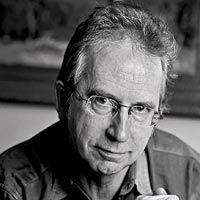|
Photograph: Carey Justine Walpole
 |
|
Peter Carey |
An Australian writer to the core, Peter Carey never strays far from his roots, despite having moved to New York City some 15 years ago. Carey’s latest novel, Theft, kicks off in a Down Under backwater, then quickly careens through jaded 1980s art worlds in Japan and New York. Part love story, part psychological thriller, and part heist-ish caper, Theft alternates between two narrators-a briefly famous painter and his mentally challenged brother-as their lives are chaotically transformed by the appearance of a gorgeous, ambitious art authenticator. Victoria Lautman chatted with Peter Carey, who spoke by phone from New York, where he heads the MFA creative writing program at Hunter College.
Q: You’ve talked about flunking science back at Monash University [Melbourne, Australia], which forced you to get a job in advertising, which led to you becoming a writer. What if you’d been good at chemistry?
A: Oh, I never could have passed the science degree. And I had written a little poetry and read a little bit, but it wasn’t until I was 19, had failed, and then suddenly found myself in an environment of people reading books and writing, too, that I just began to devour everything. I was stupid enough to think, If they can do it, I can do it too! But if I’d thought for one second that I was daring to walk out into the same arena as Conrad-forget it. I had come from a very, very small town, Bacchus Marsh, where my parents had a car dealership, and there was actually no room for me in the family business anyway, only for my brother and sister. So I had to do something . . .
Q: Interesting, considering the artist and his brother in Theft come from a small town called Bacchus Marsh.
A: Yes . . . one of the main aspects of the book is the notion of these families and people born outside the realm of “art.” So many people in Australia are like that: it’s a country of people who come from tiny places with no books, no art works, because there really was no bourgeoisie until relatively recently. Mine was the first generation that even attended college. So in Theft, there are people whose passion has developed outside that norm, and what they have in common is they’ve all discovered art. And to them it’s life itself.
Q: Why set the story in the early 1980s?
A: I’ve been away from Australia for 15 years, and when I began this book, it was such a pleasure to reinhabit that landscape, really just a huge physical pleasure to write about it and take pieces from it. I didn’t have to research it, but the only information I had confidence in was from the years I was there growing up. So I made the main character, Butcher, close to my own age [63]. His house in Bellingen-that was my home.
Q: Two Booker Prizes-Oscar and Lucinda in 1988, and True History of the Kelly Gang in 2001-that’s sort of historic. Only you and J. M. Coetzee can claim that honor.
A: I’m in good company, eh? But the first time around I was so anxious, I just thought it was wrong, and I couldn’t possibly celebrate. I did a day of press and then left London, went into hiding, in a way. After a year, I thought, You moron. That was amazing and you didn’t even enjoy it properly. Then, lo and behold! I was given a second chance-you rarely get a second chance in life-and I really, really, really enjoyed it.
Live
Hear Peter Carey talk with Victoria Lautman, Sunday, May 21st, 11:45 a.m. to 1 p.m. at Lookingglass Theatre, 821 N. Michigan Ave. Free. Call 312-832-6788 for reservations or fill out our online reservation form. WFMT (98.7 FM) will broadcast the event live at noon.


